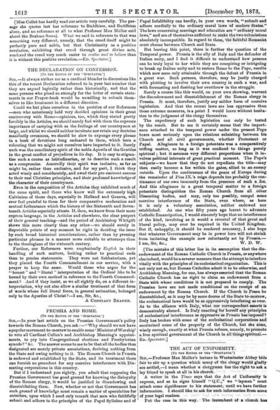PRUSSIA AND ROME.
go THE EDITOR OF THE "SPECTATOR.) SIR,—In your last article on the Prussian Government's policy towards the Roman Church, you ask :—."Why should we not have a popular movement to-morrow to enable some Minister of Worship' to veto all Cardinal Cullen's and Archbishop Manning's appoint- ments, to pry into Congregational elections and Presbyterian synods ? " &c. The answer seems to me to be that all the bodies thus designated are merely private associations, deriving nothing from the State and owing nothing to it. The Roman Church in Prussia is endowed and established by the State, and its treatment there can furnish no precedent for any coercive interference with Dis- senting corporations in this country.
But if I understand you rightly, you admit that supposing the Prussian Government has good ground for knowing the disloyalty of the Roman clergy, it would be justified in disendowing and disestablishing them. Now, whether or not that Government has such ground of knowledge must remain a matter of speculation for outsiders, upon which I need only remark that men who faithfully submit and adhere to the principles of the Papal Syllabus and of Papal Infallibility can hardly, in your own words, "submit and adhere cordially to the ordinary moral laws of modern States." The laws concerning marriage and education are "ordinary moral laws," and are of themselves sufficient to make the two submissions absolutely incompatible. In regard to them, the faithful Romanist must choose between Church and State.
But leaving this point, there is further the question of the Temporal power. Prussia is the ally of Italy and the defender of Italian unity, and I find it difficult to understand how persons can be truly loyal to her while they are conspiring or intriguing to break up Italian unity and to restore Rome to the Pope, results which now seem only attainable through the defeat of Prussia in a great war. Such persons, therefore, may be justly charged with plotting to involve their own country in such a war, and with forecasting and desiring her overthrow in the struggle.
Surely a course like this would, on your own showing, warrant the disendowment and disestablishment of the Roman clergy in Prussia. It must, therefore, justify any milder form of coercive legislation. And that the recent laws are lees oppressive than those extreme measures, is a point I would leave without hesita- tion to the judgment of the clergy themselves.
The expediency of such legislation can only be tested by the result. But to me it certainly seems that the import- ance attached to the temporal power under the present Pope bears most seriously upon the relations subsisting between his Church and all civil governments, whether Protestant or Papal. Allegiance to a foreign potentate was a comparatively trifling matter, so long as it was confined to things purely spiritual ; but it assumes very different proportions when it in- volves political interests of great practical moment. The Pope's subjects—we know that they do not repudiate the title—may then easily become a foe within the gates, allied to an enemy outside. Upon the continuance of the peace of Europe during the remainder of Pius IX.'s reign depends too probably the con- tinuance of our own immunity from the presence of such a .foe. And this allegiance in a great temporal matter to a foreign potentate distinguishes the Roman Church from all other Dissenting bodies, and may, only too possibly, compel some coercive interference of the State, even where, as here it is only a voluntary association, neither endowed nor established. As one who fifty years ago learnt to advocate Catholic Emancipation, I would sincerely hope that no interference of the kind, involving as it would a reversal of that great and liberal policy, may ever be required in the United Kingdom. But if, unhappily, it should be rendered necessary, I also hope that whatever Government may be in power here will not shrink from imitating the example now reluctantly set by Prussia.—
[The mistake of this letter lies in its assumption that the dis- endowment of the Roman Catholic Church in Prussia, or anywhere else indeed, would be a severer measure than the attempt to interfere vitally with the principles of its ecclesiastical organisation. This is not only not so, but Roman Catholics admit it to be otherwise, and Archbishop Manning, for one, has always asserted that the Roman Catholic Church has no right to claim an endowment from a State with whose conditions it is not prepared to comply. The Prussian laws are not made conditional on the receipt of an endowment by the Roman Church. If the Church in Posen be disestablished, as it may be by mere decree of the State to-morrow, the ecclesiastical laws would be as oppressively interfering as ever. As to the alliance with Italy, what our correspondent asserts is demonstrably absurd. Is Italy enacting for herself any principles of ecclesiastical interference as oppressive as Prussia has imposed? Italy has broken with some of the ecclesiastical corporations and secularised some of the property of the Church, but she aims, wisely enough, exactly at what Prussia refuses, namely, to promote a free spiritual government of the Church in all things spiritual.— ED. Spectator.]










































 Previous page
Previous page